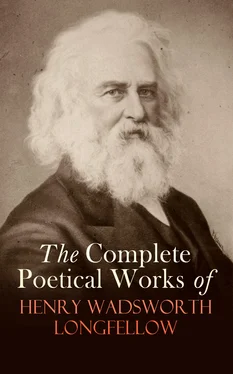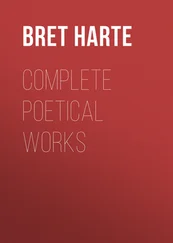Died, and was doomed to haunt unseen the chambers of children;
And how on Christmas eve the oxen talked in the stable,
And how the fever was cured by a spider shut up in a nutshell,
And of the marvellous powers of four-leaved clover and horseshoes,
With whatsoever else was writ in the lore of the village.
Then up rose from his seat by the fireside Basil the blacksmith,
Knocked from his pipe the ashes, and slowly extending his right hand,
"Father Leblanc," he exclaimed, "thou hast heard the talk in the village,
And, perchance, canst tell us some news of these ships and their errand."
Then with modest demeanor made answer the notary public—
"Gossip enough have I heard, in sooth, yet am never the wiser;
And what their errand may be I know not better than others.
Yet am I not of those who imagine some evil intention
Brings them here, for we are at peace; and why then molest us?"
"God's name!" shouted the hasty and somewhat irascible blacksmith;
"Must we in all things look for the how, and the why, and the wherefore?
Daily injustice is done, and might is the right of the strongest!"
But, without heeding his warmth, continued the notary public—
"Man is unjust, but God is just; and finally justice
Triumphs; and well I remember a story, that often consoled me,
When as a captive I lay in the old French fort at Port Royal."
This was the old man's favorite tale, and he loved to repeat it
When his neighbors complained that any injustice was done them.
"Once in an ancient city, whose name I no longer remember,
Raised aloft on a column, a brazen statue of Justice
Stood in the public square, upholding the scales in its left hand,
And in its right a sword, as an emblem that justice presided
Over the laws of the land, and the hearts and homes of the people.
Even the birds had built their nests in the scales of the balance,
Having no fear of the sword that flashed in the sunshine above them.
But in the course of time the laws of the land were corrupted;
Might took the place of right, and the weak were oppressed, and the mighty
Ruled with an iron rod. Then it chanced in a nobleman's palace
That a necklace of pearls was lost, and erelong a suspicion
Fell on an orphan girl who lived as maid in the household.
She, after form of trial condemned to die on the scaffold,
Patiently met her doom at the foot of the statue of Justice.
As to her Father in heaven her innocent spirit ascended,
Lo! o'er the city a tempest rose; and the bolts of the thunder
Smote the statue of bronze, and hurled in wrath from its left hand
Down on the pavement below the clattering scales of the balance,
And in the hollow thereof was found the nest of a magpie,
Into whose clay-built walls the necklace of pearls was inwoven."
Silenced, but not convinced, when the story was ended, the blacksmith
Stood like a man who fain would speak, but findeth no language;
All his thoughts were congealed into lines on his face, as the vapors
Freeze in fantastic shapes on the window-panes in the winter.
Then Evangeline lighted the brazen lamp on the table,
Filled, till it overflowed, the pewter tankard with home-brewed
Nut-brown ale, that was famed for its strength in the village of Grand-Pre;
While from his pocket the notary drew his papers and inkhorn,
Wrote with a steady hand the date and the age of the parties,
Naming the dower of the bride in flocks of sheep and in cattle.
Orderly all things proceeded, and duly and well were completed,
And the great seal of the law was set like a sun on the margin.
Then from his leathern pouch the farmer threw on the table
Three times the old man's fee in solid pieces of silver;
And the notary rising, and blessing the bride and the bridegroom,
Lifted aloft the tankard of ale and drank to their welfare.
Wiping the foam from his lip, he solemnly bowed and departed,
While in silence the others sat and mused by the fireside,
Till Evangeline brought the draught-board out of its corner.
Soon was the game begun. In friendly contention the old men
Laughed at each lucky hit, or unsuccessful manoeuver,
Laughed when a man was crowned, or a breach was made in the king-row
Meanwhile apart, in the twilight gloom of a window's embrasure,
Sat the lovers, and whispered together, beholding the moon rise
Over the pallid sea and the silvery mist of the meadows.
Silently one by one, in the infinite meadows of heaven,
Blossomed the lovely stars, the forget-me-nots of the angels.
Thus was the evening passed. Anon the bell from the belfry
Rang out the hour of nine, the village curfew, and straightway
Rose the guests and departed; and silence reigned in the household.
Many a farewell word and sweet good-night on the door-step
Lingered long in Evangeline's heart, and filled it with gladness.
Carefully then were covered the embers that glowed on the hearth-stone,
And on the oaken stairs resounded the tread of the farmer.
Soon with a soundless step the foot of Evangeline followed.
Up the staircase moved a luminous space in the darkness,
Lighted less by the lamp than the shining face of the maiden.
Silent she passed the hall, and entered the door of her chamber.
Simple that chamber was, with its curtains of white, and its clothes-press
Ample and high, on whose spacious shelves were carefully folded
Linen and woollen stuffs, by the hand of Evangeline woven.
This was the precious dower she would bring to her husband in marriage,
Better than flocks and herds, being proofs of her skill as a housewife.
Soon she extinguished her lamp, for the mellow and radiant moonlight
Streamed through the windows, and lighted the room, till the heart of the maiden
Swelled and obeyed its power, like the tremulous tides of the ocean.
Ah! she was fair, exceeding fair to behold, as she stood with
Naked snow-white feet on the gleaming floor of her chamber!
Little she dreamed that below, among the trees of the orchard,
Waited her lover and watched for the gleam of her lamp and her shadow.
Yet were her thoughts of him, and at times a feeling of sadness
Passed o'er her soul, as the sailing shade of clouds in the moonlight
Flitted across the floor and darkened the room for a moment.
And, as she gazed from the window, she saw serenely the moon pass
Forth from the folds of a cloud, and one star follow her footsteps,
As out of Abraham's tent young Ishmael wandered with Hagar!
Table of Contents
Pleasantly rose next morn the sun on the village of Grand-Pre.
Pleasantly gleamed in the soft, sweet air the Basin of Minas,
Where the ships, with their wavering shadows, were riding at anchor.
Life had long been astir in the village, and clamorous labor
Knocked with its hundred hands at the golden gates of the morning.
Now from the country around, from the farms and neighboring hamlets,
Came in their holiday dresses the blithe Acadian peasants.
Many a glad good-morrow and jocund laugh from the young folk
Made the bright air brighter, as up from the numerous meadows,
Where no path could be seen but the track of wheels in the greensward,
Group after group appeared, and joined, or passed on the highway.
Long ere noon, in the village all sounds of labor were silenced.
Thronged were the streets with people; and noisy groups at the house-doors
Sat in the cheerful sun, and rejoiced and gossiped together.
Every house was an inn, where all were welcomed and feasted;
Читать дальше












